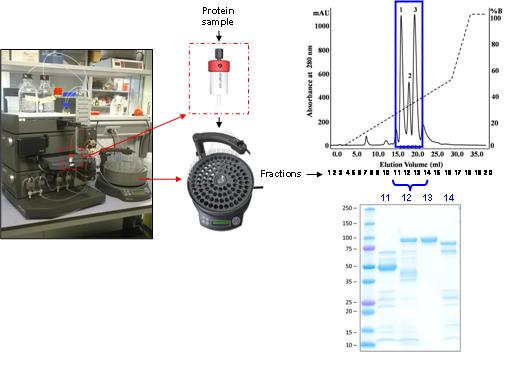
The Proteomics Laboratory has the necessary equipment to offer two main services:
PROTEIN RESOLUTION USING TWO-DIMENSIONAL ELECTROPHORESIS
Separation of protein mixtures can be carried out by two-dimensional (2D) electrophoresis. It is a much more resolutive technique than the conventional one (one-dimensional electrophoresis), since in it, proteins are only separated according to their mass, while in 2D, they are separated both by their native charge and by their mass.

Using two-dimensional electrophoresis, very complete and detailed studies of the differential expression of proteins between samples can be carried out (2D-DIGE: two-dimensional difference gel electrophoresis). To do this, each sample will be marked with a different fluorochrome and the protein maps will be compared in a simple and effective way.

PURIFICATION OF PROTEINS USING LIQUID CHROMATOGRAPHY
On the other hand, the service has an FPLC for the separation of proteins by liquid chromatography.
Proteins can be purified by ion exchange chromatography (HiTrap Q and SP from GE), filtration (superdex 75 and 200, superose 6 increase from GE) or affinity (HisTrap, HiTrap ProteinA, GSTrap, etc), using the corresponding columns.

PRODUCTION OF RECOMBINANT PROTEINS
The IBMCP has developed a new service for the production of recombinant proteins in E. coli. Bacterial systems for the expression of heterologous proteins have important advantages in terms of ease of use, cost and production times.
The service starts from the organism transformed with the recombinant protein tagged with His/MBP/GST. You will perform small-scale expression assays to design the protocol with the parameters optimized for the specific protein. More information in the following PDF:
In the future, the possibility of producing recombinant proteins in eukaryotic systems (P. pastoris or S. cerevisiae) is considered, since it allows the expression of proteins with post-translational modifications.was Bergua
ServiceManager
Service Technician
NORMS
PROTEIN RESOLUTION USING TWO-DIMENSIONAL ELECTROPHORESIS
7 cm isoelectric focusing strips: a minimum of 100 μg of protein is required. 24 cm isoelectric focusing strips: a minimum of 250 μg of protein is required.
Ideally, in both cases, the proteins are resuspended in a given buffer, in a maximum volume of 200 μl.
NOTE: It is very important that from the initial process of protein extraction, the user take precautions against contamination of their samples with keratins, wearing gloves and gown at all times.
PURIFICATION OF PROTEINS USING LIQUID CHROMATOGRAPHY
The sample must be filtered and/or centrifuged prior to injection to avoid clogging of column and FPLC filters.
The buffers must be provided by the user, and can be filtered in the service.
RATES

Protein Separation: |
||
Ettan IPGphor3  < /td> < /td> |
Ettan DALTsix  < /td> < /td> |
|
Image Capture of the Gels: |
||
• Typhoon TRIO  |
• ImageScanner  </td > </td > |
|
Protein preparation for identification: |
||
• Ettan Spot Picker  |
• Ettan TA Digester  |
|
Protein Purification: |
||
• ÄKTA purifier  |
||
| Part of the scientific equipment of this service has been co-financed with ERDF Funds |